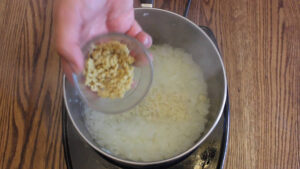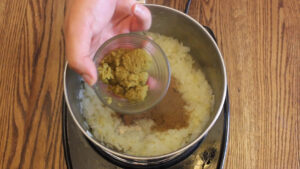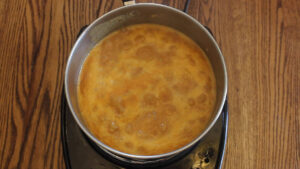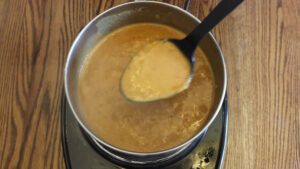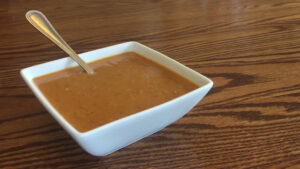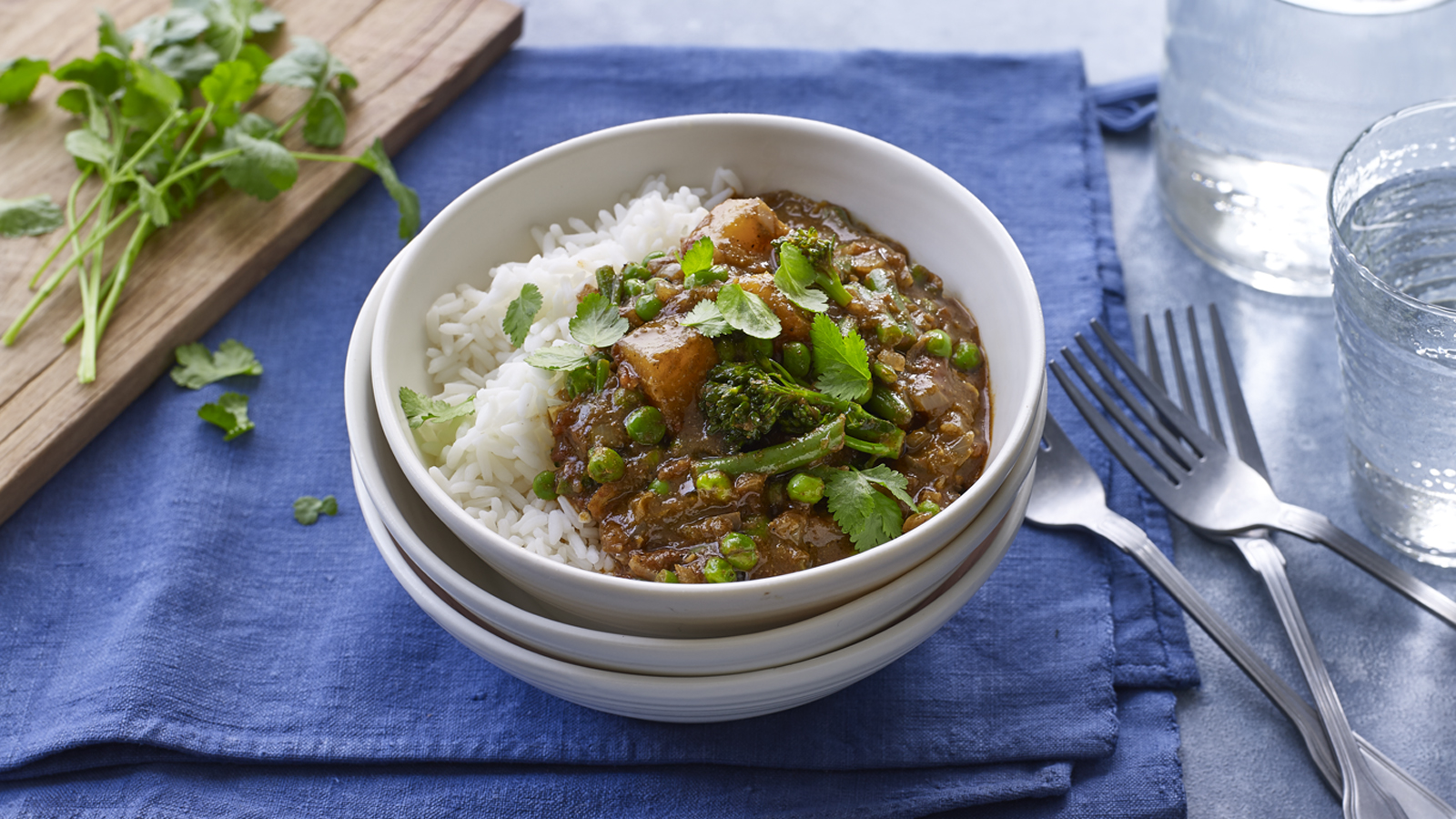
A rich vegan coconut curry sauce adds depth, warmth, and gentle heat. It pairs well with rice, tofu, noodles, or vegetables using just a few ingredients.
After exploring Brazilian flavors, the focus now shifts to Southeast Asian-inspired cooking. The recipe below offers a simple way to create a creamy, plant-based vegan coconut curry sauce.
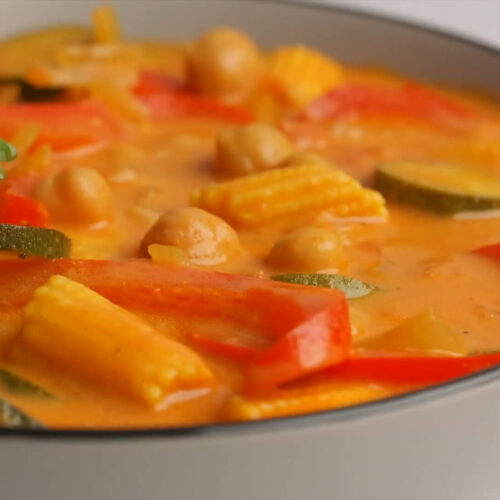
Vegan Coconut Curry Sauce Recipe
Equipment
- Medium saucepan
- Whisk
- Measuring Cups and Spoons
- Chef’s knife and cutting board
Ingredients
- 1 Tbsp coconut oil or olive oil
- 3 Cloves garlic minced
- 1 Tbsp fresh ginger minced
- 1-2 Tbsp red curry paste adjust for spice level
- 1 Can coconut milk full-fat for creaminess
- 1 Tbsp soy sauce or tamari for gluten-free
- 1 Tbsp maple syrup or sugar
- 1 Tbsp lime juice
- ½ Tsp turmeric powder
- Salt to taste
- Fresh cilantro for garnish
Instructions
- Heat the Oil: In a medium saucepan over medium heat, add the coconut oil. Allow it to melt and heat for about 1 minute.
- Sauté Aromatics: Add the minced garlic and ginger to the pan. Sauté for 1-2 minutes until fragrant, being careful not to let them burn
- Add Curry Paste: Stir in the red curry paste and cook for another 1-2 minutes to release the flavors. Adjust the amount of paste based on your preferred spice level.
- Combine with Coconut Milk:Pour in the coconut milk, stirring to combine with the curry paste mixture until smooth.
- Season the Sauce: Add soy sauce, maple syrup (or sugar), lime juice, and turmeric powder. Whisk everything together, and bring the sauce to a gentle simmer. Let it cook for about 10 minutes, stirring occasionally, until it slightly thickens.
- Taste and Adjust:Season with salt to taste and adjust sweetness or lime juice if needed.
- Serve:Remove from heat and garnish with fresh cilantro if desired. Serve warm over your favorite dishes like rice, noodles, tofu, or roasted vegetables.
Video
Notes
For Extra Creaminess: Use full-fat coconut milk. Light coconut milk will work but may yield a thinner sauce.
Storage: Keep leftovers in an airtight container in the refrigerator for up to 4 days. Reheat gently on the stove, adding a splash of coconut milk if the sauce has thickened too much.
Flavor Variations
Customize the Vegan Coconut Curry Sauce to match your favorite flavors or add extra depth! Here are some ideas:
- Lemongrass: Add a stalk of crushed lemongrass to the sauce while it simmers to bring a fresh, citrusy note. Just remove the stalk before serving.
- Kaffir Lime Leaves: Toss in 1-2 kaffir lime leaves for a fragrant, zesty flavor. Like lemongrass, these should be removed before serving.
- Fresh Herbs: Add fresh basil, cilantro, or Thai basil just before serving for a burst of herbal flavor.
- Make It Sweeter or More Tangy: Adjust the sauce’s sweetness with extra maple syrup, or add extra lime juice or even a splash of rice vinegar for more acidity.
- Spice It Up: For a stronger kick, add fresh chopped chili, a sprinkle of cayenne, or a teaspoon of chili paste. Experiment with different types of chili peppers to find the heat level and flavor profile you love.
- Creamy Nut Butter: A tablespoon of peanut or almond butter can add even more creaminess and a rich, nutty undertone. This variation works especially well when serving with noodles or stir-fried vegetables.
Storage and Freezing Tips
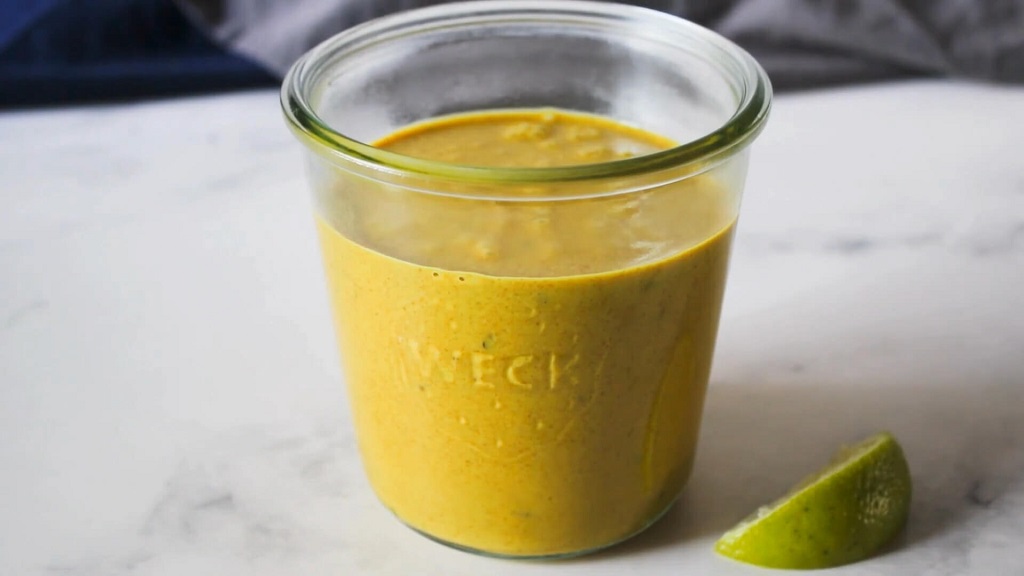
Store leftover coconut curry sauce in an airtight container in the refrigerator for up to 4 days. When reheating, warm it gently on the stovetop over low heat, stirring occasionally. If the sauce has thickened, add a splash of coconut milk or water to restore the desired consistency.
To freeze, allow the sauce to cool completely, then transfer it to a freezer-safe container or resealable freezer bag. Label with the date, and freeze for up to 2 months. When ready to use, thaw overnight in the refrigerator, then reheat gently on the stovetop, adding a bit of coconut milk or water if needed to bring back its creamy texture.
Best Foods to Make with Vegan Coconut Curry Sauce
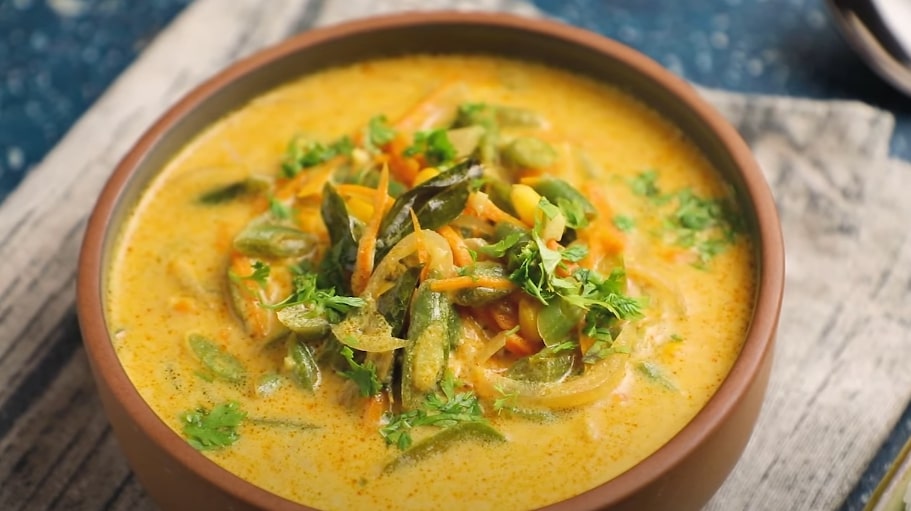
A creamy coconut curry sauce like this one adds a flavorful twist to a wide range of dishes. Here are some ideas to make the most of it:
- Stir-Fried Vegetables: Toss bell peppers, zucchini, broccoli, and snap peas in the sauce for a quick, flavorful stir-fry. Serve over steamed jasmine rice or rice noodles for a complete meal.
- Tofu or Tempeh: Marinate tofu or tempeh in the sauce, then pan-fry or bake until golden. Add extra sauce as a drizzle or dip to maximize flavor.
- Chickpea or Lentil Curry: Use the sauce as a base for a protein-rich curry by adding cooked chickpeas or lentils. Simmer until they soak up the flavors, then serve with naan or basmati rice.
- Roasted Vegetables and Grain Bowls: Pour the sauce over roasted sweet potatoes, carrots, and cauliflower, then serve atop quinoa or brown rice. This combination makes a hearty, healthy bowl with layers of flavor.
- Rice Noodles: Cook rice noodles and toss them in the sauce along with vegetables like carrots, bell peppers, and bok choy. Garnish with fresh herbs and a sprinkle of crushed peanuts for a Thai-inspired noodle dish.
- Veggie-Stuffed Sweet Potatoes: Roast whole sweet potatoes, split them open, and drizzle with the coconut curry sauce. Add a topping of sautéed greens or chickpeas for a complete meal.
- Baked Cauliflower or Broccoli: Roast or steam cauliflower or broccoli florets, then toss them in the sauce and bake briefly for a creamy, spiced side dish or main.
- Grilled or Steamed Fish: For those who aren’t strictly vegan, mild white fish like cod, tilapia, or halibut pairs beautifully with the sauce. Drizzle it over the fish after grilling or steaming to add an extra layer of flavor.
All these meals are a perfect combo for a family that follows a vegan diet plan.
FAQs
How can I make the coconut curry sauce thicker?
To thicken the sauce, simmer it longer, allowing excess liquid to evaporate. Alternatively, mix 1 teaspoon of cornstarch with 2 teaspoons of water to form a slurry, then stir it into the sauce. Continue simmering until it reaches your desired consistency.
Can I use light coconut milk instead of full-fat?
Yes, light coconut milk can be used, but it may result in a thinner and less creamy sauce. For a richer flavor, full-fat coconut milk is recommended, but light coconut milk works if you prefer a lighter sauce.
How long does coconut curry sauce last in the fridge?
Coconut curry sauce lasts up to 4 days in the refrigerator when stored in an airtight container. Reheat gently on the stovetop or in the microwave, adding a splash of coconut milk or water if it has thickened too much.
Can I freeze coconut curry sauce?
Yes, coconut curry sauce freezes well. Allow it to cool completely, then store it in a freezer-safe container for up to 2 months. Thaw in the refrigerator overnight and reheat gently on the stovetop.
What can I use instead of red curry paste?
If you don’t have red curry paste, use a combination of curry powder (1-2 teaspoons) and a pinch of cayenne pepper for heat. You can also try yellow or green curry paste for a different flavor profile.
Last Words
Give this Vegan Coconut Curry Sauce a try and bring a burst of flavor to your meals! It’s an easy, versatile recipe that’s perfect for experimenting and adding your own personal touch. Whether you’re using it for a quick weeknight dinner or a meal-prep staple, this sauce is sure to impress. Enjoy, and don’t forget to share your feedback and favorite ways to use it!


